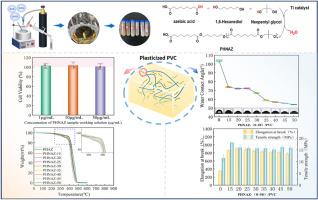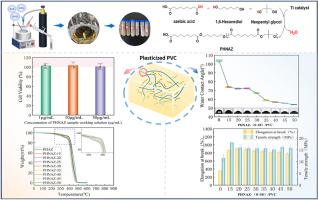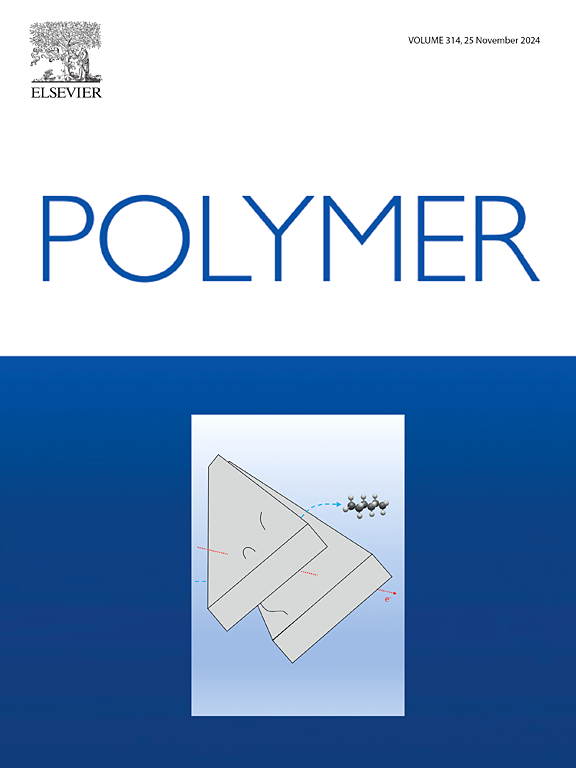聚氯乙烯用生物相容性壬二酸基共聚酯增塑剂的研制
IF 4.5
2区 化学
Q2 POLYMER SCIENCE
引用次数: 0
摘要
本研究以壬二酸和己二醇为原料,经新戊二醇(NPG)改性,采用直接酯化法制备共聚增塑剂PHNAZ。一系列表征测试表明,PHNAZ共聚酯增塑剂的数平均分子量小于2000,分散系数小于2,在250℃以下表现出优异的热稳定性。PHNAZ塑化PVC样品的热降解温度高于250℃,玻璃化转变温度降至-33℃,亲水性显著提高。PHNAZ-50/PVC的水接触角最小,平均为53.956°。本研究的重点是对制备的PHNAZ共聚酯增塑剂进行了浓度为1 μg/mL、10 μg/mL和50 μg/mL的细胞毒性测试,平均细胞存活率均超过100%,具有良好的生物相容性。PHNAZ的塑化效果显著,其中PHNAZ-20/PVC的断裂伸长率达到913.6%,塑化效率达到260.0%。这些结果表明,PHNAZ不仅具有优异的化学和热性能,而且具有良好的生物相容性和高塑化能力,具有广阔的应用前景。本文章由计算机程序翻译,如有差异,请以英文原文为准。


Development of biocompatible azelaic acid-based copolyester plasticizers for PVC applications
In this study, the copolyester plasticizers PHNAZ, synthesized from azelaic acid and hexanediol and modified by neopentyl glycol (NPG), was prepared via direct esterification. A series of characterization tests revealed that the number-average molecular weight of the PHNAZ copolyester plasticizers was less than 2000 with a dispersion coefficient of less than 2, demonstrating excellent thermal stability below 250 °C. PVC samples plasticized with PHNAZ showed thermal degradation temperatures above 250 °C, reduced glass transition temperatures to −33 °C, and significantly improved hydrophilicity. Notably, the water contact angle of PHNAZ-50/PVC was smallest, averaging 53.956°. The highlight of the study is the cytotoxicity testing of the prepared PHNAZ copolyester plasticizer at concentrations of 1 μg/mL, 10 μg/mL, and 50 μg/mL, where the average cell survival rate exceeded 100 %, indicating excellent biocompatibility. Additionally, PHNAZ displayed outstanding plasticizing effects, particularly PHNAZ-20/PVC, which achieved an elongation at break of 913.6 % and a plasticizing efficiency of 260.0 %. These results suggest that PHNAZ not only excels in chemical and thermal properties but also exhibits good biocompatibility and high plasticizing capability, indicating broad application prospects.
求助全文
通过发布文献求助,成功后即可免费获取论文全文。
去求助
来源期刊

Polymer
化学-高分子科学
CiteScore
7.90
自引率
8.70%
发文量
959
审稿时长
32 days
期刊介绍:
Polymer is an interdisciplinary journal dedicated to publishing innovative and significant advances in Polymer Physics, Chemistry and Technology. We welcome submissions on polymer hybrids, nanocomposites, characterisation and self-assembly. Polymer also publishes work on the technological application of polymers in energy and optoelectronics.
The main scope is covered but not limited to the following core areas:
Polymer Materials
Nanocomposites and hybrid nanomaterials
Polymer blends, films, fibres, networks and porous materials
Physical Characterization
Characterisation, modelling and simulation* of molecular and materials properties in bulk, solution, and thin films
Polymer Engineering
Advanced multiscale processing methods
Polymer Synthesis, Modification and Self-assembly
Including designer polymer architectures, mechanisms and kinetics, and supramolecular polymerization
Technological Applications
Polymers for energy generation and storage
Polymer membranes for separation technology
Polymers for opto- and microelectronics.
 求助内容:
求助内容: 应助结果提醒方式:
应助结果提醒方式:


